
"Zdravljica" is a carmen figuratum poem by the 19th-century Romantic Slovene poet France Prešeren, inspired by the ideals of Liberté, égalité, fraternité. It was written in 1844 and published with some changes in 1848. Four years after it was written, Slovenes living within Habsburg Empire interpreted the poem in spirit of the 1848 March Revolution as political promotion of the idea of a united Slovenia. In it, the poet also declares his belief in a free-thinking Slovene and Slavic political awareness. In the late 1980s, it was adopted as the national anthem of Slovenia.

France Prešeren was a 19th-century Romantic Slovene poet whose poems have been translated into English, French, German, Italian, Spanish, Hungarian, Slovak, Polish, Russian, Ukrainian, Belorussian, Bengali, as well as to all the languages of former Yugoslavia, and in 2013 a complete collection of his "Poezije" (Poems) was translated to French.

Vrba is one of ten villages in the Municipality of Žirovnica in the Upper Carniolan region of Slovenia. It was first mentioned in written sources from 1247 and is a typical example of a compact Alpine village. According to the 2002 census, it has a population of 196. The Slovene national poet France Prešeren, who was born in the village, dedicated it the sonnet "O Vrba", the first of his Sonnets of Misfortune.

The Municipality of Žirovnica is a municipality in Slovenia. It is located in the historic Upper Carniola region, on the southern slope of the Karavanke mountain range, close to the border with Austria. The municipality borders with Jesenice to the west, Bled and Radovljica to the south, and Tržič to the east.
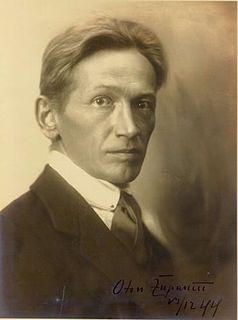
Oton Župančič was a Slovene poet, translator and playwright. He is regarded, alongside Ivan Cankar, Dragotin Kette and Josip Murn, as the beginner of modernism in Slovene literature. In the period following World War I, Župančič was frequently regarded as the greatest Slovenian poet after Prešeren, but in the last forty years his influence has been declining and his poetry has lost much of its initial appeal.
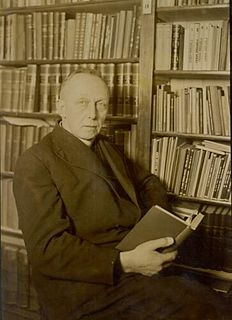
Fran Saleški Finžgar was perhaps the most popular Slovene folk writer. He is particularly known for his novels and short stories, although he also wrote poems and plays.
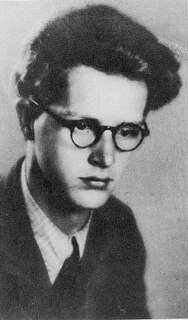
France Balantič was a Slovene poet. His works were banned from schools and libraries during the Titoist regime in Slovenia, but since the late 1980s he has been re-evaluated as one of the foremost Slovene poets of the 20th century.
The Prešeren Award, also called the Grand Prešeren Award, is the highest decoration in the field of artistic and in the past also scientific creation in Slovenia. It is awarded each year by the Prešeren Fund to two eminent Slovene artists, with the provision that their work was presented to the public at least two years ago. In general, it may be given to an artist only once, and can also be given to a group of artists. It is given on the eve of the Prešeren Day, the Slovenian cultural holiday celebrated on the anniversary of the death of France Prešeren, the Slovene national poet. On the same occasion, the Prešeren Fund Awards or Small Prešeren Awards are given to up to six artists. The awardees also receive a financial award, with the Prešeren Award three times as high as the Prešeren Fund Award. In recent years, the awards have been increasingly given for lifetime work.

The Prešeren House is a house in the village of Vrba in the Municipality of Žirovnica in Slovenia. It is the house where the Slovene poet France Prešeren was born in 1800. The Slovene theologian and archbishop Anton Vovk was also born in the same house in 1900. The house is a good example of an Upper Carniolan farmhouse. Since 1939, it has housed a small museum collection with furnishings from the poet’s time.

St. Mark's Church is a small church on the outskirts of the village of Vrba in Upper Carniola in Slovenia. Though it is a small and simple church, it has achieved near mythical status in Slovenia, after it was mentioned in the sonnet O Vrba by Slovene national poet France Prešeren. Though it is only mentioned in the last verse of this single sonnet, it has come to symbolise homeliness and safety to which one can turn when bitterness and disappointment over having followed one's destiny to foreign lands becomes too much to bear. In January 2011, it was proclaimed cultural monument of national importance by the Government of Slovenia.
O, Vrba is a key Slovene pre-war documentary film. It was commissioned by the Educational Union, directed by Mario Förster and produced in 1941 under the auspice of the company Emona Film. Its first internal premiere took place in the beginning of 1942. Due to the cultural silence imposed in the Slovene Lands during World War II, it was released only in 1945 by the State Film Company. It is a short black and white film that shows the Prešeren House after it was opened as a museum, on the day when the authors found out about the German assault on Poland, reflected in a dark atmosphere of clouds traversing the Karawanks. The film reflects Förster's fine feel for light and composition. It contains voice recordings of the writer Fran Saleški Finžgar, who led the arrangement of the house, and of the poet Oton Župančič, who recited the Prešeren's poem O Vrba. The music, written by Janko Gregorc, was the first original Slovene film music. The montage and mixing of sound and picture were done by Rudi Omota.

Avgust Pirjevec was a Slovene literary scholar, lexicographist and librarian.

Anthem of the Slovene nation is based on a carmen figuratum poem by the 19th-century Romantic Slovene poet France Prešeren, inspired by the ideals of Liberté, égalité, fraternité, and is one of the national symbols of Slovenia as a sovereign nation.

The Archbishop Anton Vovk was born in the village of Vrba in Upper Carniola in the same house where the poet France Prešeren had been born 100 years earlier.

Josip Stritar was a Slovene writer, poet, essayist, the first aesthetic critic, playwright, publisher and translator.

Ciril Zlobec was a Slovene poet, writer, translator, journalist and former politician. He is best known for his poems and has published several volumes of poetry. In 1990 he became a member of the Presidency of Slovenia at a critical time for Slovene independence.
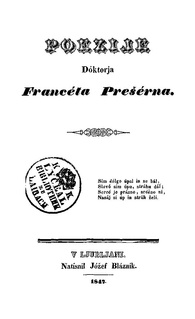
The Baptism on the Savica is a long two-part epic-lyric poem written by the Slovene Romantic poet France Prešeren. According to the literary historian Marko Juvan, the work may be considered the Slovene national epic. It is a narration about a hero and the woman he loves in the time of violent Christianisation of the predecessors of the Slovenes.
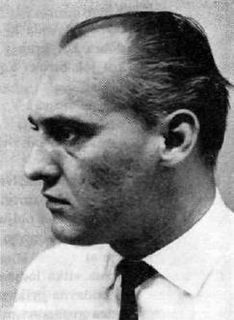
Ivan Minatti was a Slovene poet, translator, and editor. He started writing poetry before World War II, but principally belongs to the first postwar generation of Slovene poets. He is one of the best representatives of Slovene Intimism.
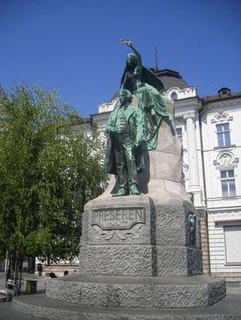
The Prešeren Monument in Ljubljana, also Prešeren Statue in Ljubljana, is a late Historicist bronze statue of the Slovene national poet France Prešeren in Ljubljana, the capital of Slovenia. It stands in the eastern side of Prešeren Square, in front of the Central Pharmacy Building in Ljubljana, the capital of Slovenia. It is among the best-known Slovenian monuments.
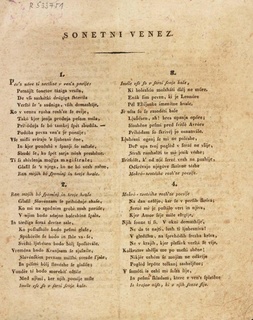
A Wreath of Sonnets, sometimes also translated as A Garland of Sonnets, is a crown of sonnets that was written by France Prešeren in 1833. It was published for the first time in the German-language Ljubljana newspaper Illyrisches Blatt on 22 February 1834. It consists of 15 sonnets and is enriched with acrostic in the concluding sonnet. In the crown, Prešeren tied together the motives of his own unhappy love towards Julija Primic with that of an unhappy, subjugated homeland.






















